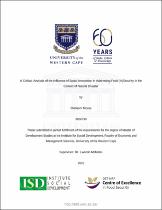| dc.description.abstract | The conventional top-down, command-and-control approach to disaster management and buffers
implemented during times of crisis are often rendered unsustainable, as these strategies fail to
encourage community resilience. In South Africa, recent years have seen the emergence of
bottom-up practices and processes where diverse actors co-create solutions. However, despite
these inclusive models, local communities remain plagued by poverty and food insecurity. These
social inequalities are exacerbated in the context of natural and human disaster. It is against this
backdrop that this study investigates the influence of social innovation, novel solutions to
pressing social challenges, in addressing food (in)security during times of crisis. The study is
qualitatively oriented and makes use of semi-structured in-depth interviews, as well as literature
review and document analysis data collection methods. This research endeavour is affiliated to
the DSI-NRF Centre of Excellence in Food Security and the Social Innovation & Development
Niche Area/Special Projects Unit. The study is conducted, given the levels of food insecurity in
South Africa, amplified by the COVID-19 pandemic and its after-effects, past and ongoing
floods and drought, insecure employment, widening inequality, climate crisis, etc. The study
analyses the influence of social innovations that emerged to address the threat posed by the
COVID crisis and the recent Cape Town water crisis on food security. | en_US |

